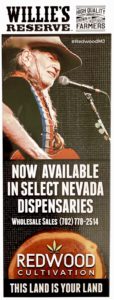(Updated with additional information on the emergency regulations adopted this week. A second update adds a warning about mailing permits.)
Recreational marijuana is set to go on sale legally in Nevada on Saturday, which means we can also expect more advertising for dispensaries.
How much, though, remains to be seen. Three slick, ad-carrying magazines were born of the medical marijuana industry in Nevada (and are members of the Nevada Press Association), two serving the competitive Las Vegas Market, where more than 40 dispensaries are operating so far, and one magazine for the Lake Tahoe region. Tahoe Cannabis (the cover is at the top of this post) is poised to serve Northern Nevada and California, when that state’s legal sales kick in.
But existing publications so far have seen only a smattering of marijuana ads in Reno and Las Vegas, and I’ve seen or heard nothing on broadcast TV or radio. For most rural areas of the state, including Carson City, recreational marijuana will not be sold as of the Saturday launch.
Through the flurry of dozens of pot-related bills in the legislative session that concluded earlier this month, one emerged with some specific restrictions on how marijuana may be advertised.
All about the children
The first thing to know is the state restrictions are all about children. Here’s text from Senate Bill 344:
A medical marijuana dispensary or facility for the production of edible marijuana products or marijuana-infused products shall not engage in advertising that in any way makes marijuana, edible marijuana products or marijuana-infused products appeal to children, including without limitation, advertising which uses an image of a cartoon character, mascot, action figure, balloon, fruit or toy.
Similarly, the packaging can’t contain “an image of a cartoon character, mascot, action figure, balloon or toy, except that such an item may appear in the logo of the marijuana product manufacturing facility which produced the product,” according to the statute. Nor can they be “labeled or marketed” as candy.
The second thing to know is that the law places responsibility on the advertiser — not the newspaper — for adhering to the rules.
Emergency regulations adopted by the Nevada Department of Taxation this week take the advertising restrictions a bit farther, but they’re not necessarily more specific.
Marijuana advertisements can’t be misleading, “promote overconsumption,” depict the consumption of marijuana, or depict anyone under the age of 21 or “contain any other depiction which is designed in any manner to be appealing to or encourage consumption of marijuana or marijuana products by a person who is less than 21 years of age.”
And then there’s this. Marijuana establishments:
Shall not advertise in any publication, or on radio, television or any other medium if 30 percent or more of the audience of that medium is reasonably expected to be persons who are less than 21 years of age.
Clearly, they shouldn’t be advertising in comic books or on Saturday morning cartoon shows. But that leaves a lot of room for interpretation — as the tobacco industry can testify with the controversy over Joe Camel.
Grown from medical marijuana
The rules generally have grown from the regulations for medical marijuana, which are contained in this policy, adopted in 2014 by the state’s Division of Public and Behavioral Health. They outline a procedure for the state to review all logos, signs and advertisements for medical marijuana establishments.
The policy notes “Designers shall avoid using marijuana slang such as bud, pot, weed, grass, joint, doobie, 420.”
While the responsibility is on the pot seller, any public reaction to sketchy advertising — potentially aimed at children, for example — seems just as likely to fall on the publication printing the ad as it does on the marijuana business that paid for it.

In other words, many publications don’t want to take those calls. Although marijuana legalization in Nevada passed a public initiative handily (54 percent to 45 percent, a margin of about 100,000 votes) in November, there’s still significant opposition and many questions to be answered on how the business shakes out.
Still a federal prohibition
And it’s still a federal crime, which is why the gaming industry is steering clear.
That means the question of whether marijuana advertising runs afoul of federal law also remains murky.
The Drug Enforcement Administration puts it this way:
“(1) It shall be unlawful for any person to place in any newspaper, magazine, handbill, or other publications, any written advertisement knowing that it has the purpose of seeking or offering illegally to receive, buy, or distribute a Schedule \1\ I controlled substance. As used in this section the term “advertisement” includes, in addition to its ordinary meaning, such advertisements as those for a catalog of Schedule \1\ I controlled substances and any similar written advertisement that has the purpose of seeking or offering illegally to receive, buy, or distribute a Schedule \1\ I controlled substance. The term “advertisement” does not include material which merely advocates the use of a similar material, which advocates a position or practice, and does not attempt to propose or facilitate an actual transaction in a Schedule \1\ I controlled substance.”
The argument to the contrary is that the federal law doesn’t specifically apply to states that have legalized marijuana.
Three of Nevada Press Association’s newer members — Elevate Nevada, Vegas Cannabis and Tahoe Cannabis — have been publishing medical marijuana advertising in their pages for months. All are specialty magazines started with the medical marijuana industry.
The Reno News & Review, a longtime alternative weekly newspaper, has been running a page of advertising as a Northern Nevada Cannabis Guide.
Broadcasters seem skittish because they fear they could be putting their FCC licenses at risk.
Similarly, internet companies like Google and Facebook may restrict marijuana advertising for fear of running afoul of federal statutes. The same code says of internet advertising:
“It shall be unlawful for any person to knowingly or intentionally use the Internet, or cause the Internet to be used, to advertise the sale of, or to offer to sell, distribute, or dispense, a controlled substance where such sale, distribution, or dispensing is not authorized by this subchapter or by the Controlled Substances Import and Export Act [21 U.S.C. 951 et seq.].
“(B) Examples of activities that violate subparagraph (A) include, but are not limited to, knowingly or intentionally causing the placement on the Internet of an advertisement that refers to or directs prospective buyers to Internet sellers of controlled substances who are not registered with a modification under section 823(f) of this title.”
Congress prevented the Justice Department from going after medical marijuana, but Attorney General Jeff Session asked those shackles be removed in a May letter to leadership. The administration’s policy on recreational policy is far from clear at this point, but it seems reasonable to assume if he wants to pursue medical marijuana, then recreational pot also is on the radar.
Nothing has been said about the federal advertising restrictions, as far as I could tell. One warning, however, is that many newspapers hold mailing permits from the U.S. Postal Service, which would be one means by which the federal government could punish them.
In Colorado, a bill to outlaw advertising marijuana to anyone under 21 is waiting the governor’s signature. It’s also not clear there how that would be interpreted.
 Nevada Press Association The best in Nevada journalism since 1924
Nevada Press Association The best in Nevada journalism since 1924
